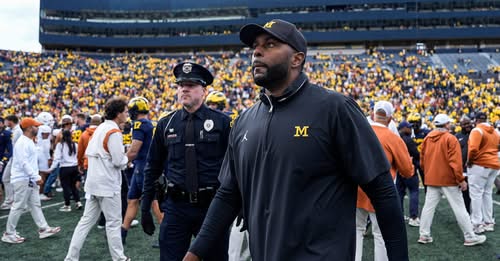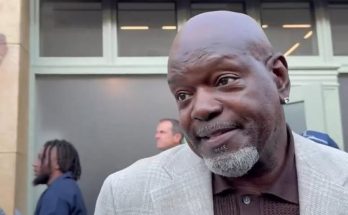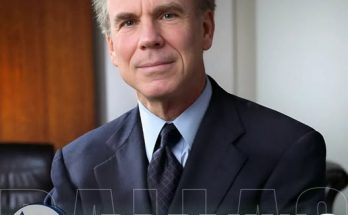In a stunning development that has sent shockwaves through the college football world, Michigan head coach Sherrone Moore will reportedly serve a multi-game suspension during the 2025 season. The news, first reported by multiple outlets with sources close to the program, has not yet been formally confirmed by the University of Michigan or Moore himself, but the implications are already reverberating across the Big Ten and beyond.
The exact length and reasoning behind the suspension have not yet been publicly disclosed. However, sources familiar with the situation indicate that the punishment is connected to a lingering NCAA investigation that predates Moore’s official promotion to head coach, stemming from alleged program-level infractions that occurred during Jim Harbaugh’s final seasons at the helm. Moore, who was elevated to full-time head coach after serving as offensive coordinator and acting head coach during portions of the 2023 and 2024 seasons, has already been under scrutiny during various phases of Michigan’s recent success.
Moore’s rapid rise in the Michigan program made him one of the most respected young coaches in the nation. After leading the Wolverines to multiple key wins in Harbaugh’s absence—most notably during Harbaugh’s three-game suspension in the 2023 season—Moore earned praise for his leadership, composure, and offensive prowess. Michigan’s dominant running game and efficient play-calling under his watch helped the team reach the College Football Playoff and eventually secure the 2023 National Championship.
His performance as acting head coach laid the groundwork for a smooth transition when Harbaugh departed for the NFL following the 2024 season. Moore took the reins of the program with the full support of university leadership, players, and the fanbase. Yet even as he was celebrated as the future of Michigan football, questions lingered about possible NCAA fallout from previous seasons, especially surrounding allegations of impermissible recruiting contact, electronic scouting violations, and institutional accountability.
Now, with this reported suspension, Moore finds himself in the crosshairs of those lingering issues. Though it remains unclear whether Moore is being directly punished for any personal misconduct or rather for actions under his watch as a coordinator and acting head coach, the decision to sideline him for multiple games signals the NCAA’s intent to hold key figures accountable regardless of official titles at the time of the violations.
Michigan football, one of the sport’s most storied programs, has been no stranger to controversy in recent years. The 2023 and 2024 seasons were both marked by off-field headlines that overshadowed on-field dominance. Harbaugh’s suspensions, NCAA investigations, and conflicting public statements led to tension between the program and governing bodies. Still, the Wolverines managed to excel on Saturdays, posting back-to-back undefeated regular seasons and solidifying their place among the nation’s elite.
Moore’s leadership was central to that success. His authenticity and connection with players made him a beloved figure in the locker room, while his ability to manage in-game situations and make strategic adjustments won over skeptics in the media. His emotional postgame interviews—including the memorable “I love you, Coach Harbaugh” speech following a key victory over Penn State—became defining moments of Michigan’s resilience and unity during turbulent times.
That makes this latest development all the more jarring. While coaching suspensions are not unprecedented, they are rarely levied against a newly promoted head coach who had not been the official face of the program when alleged violations occurred. If the NCAA’s stance is rooted in the belief that Moore bore partial responsibility due to his previous roles, it raises broader questions about how the governing body will enforce accountability going forward.
From a competitive standpoint, the timing of Moore’s suspension could significantly impact Michigan’s 2025 season. The Wolverines are expected to open with a tough non-conference schedule and face early Big Ten tests against conference newcomers Oregon and USC. Without Moore on the sidelines, the responsibility of leading the team will likely fall to associate head coach Grant Newsome or another member of the staff. Continuity and preparation will be crucial in navigating the suspension period without derailing championship aspirations.
Internally, the program is expected to rally around Moore, as they have in the past. Players have routinely voiced their respect and support for their head coach, and early reactions on social media have included an outpouring of encouragement from current and former Wolverines. Several NFL-bound Michigan alumni have posted cryptic messages defending Moore’s character and expressing disappointment with the NCAA’s process.
Publicly, the university has yet to issue a detailed statement. It remains to be seen whether Michigan will contest the decision or accept the terms of the suspension. Athletic Director Warde Manuel has historically taken a collaborative tone with NCAA officials, but pressure from alumni, donors, and fan groups may influence the university’s stance. Legal challenges or appeals could still alter the final outcome.
Meanwhile, the NCAA’s opaque process continues to draw criticism. Many observers have noted the inconsistency in how violations are investigated and punished, with some programs facing lengthy probes and harsh penalties while others appear to escape scrutiny altogether. The growing tension between traditional enforcement and the modern realities of NIL, transfer portal freedom, and conference realignment only adds to the confusion and dissatisfaction.
Moore’s case could become a watershed moment in the ongoing debate over fairness and transparency in college athletics. If the NCAA is seen as punishing a rising Black head coach disproportionately—particularly one who inherited a complicated situation—critics will undoubtedly use this case as a rallying cry for reform. Conversely, if new evidence emerges that implicates Moore more directly, the focus may shift to questions about leadership, compliance culture, and institutional responsibility.
For now, the football world watches and waits. Michigan, under Moore’s guidance, was expected to enter the 2025 season as a top-five team with legitimate national title hopes. Quarterback competition, defensive depth, and offensive line continuity were among the key storylines heading into summer workouts. Now, uncertainty looms over the coaching situation, and the potential ripple effects are impossible to ignore.
Recruiting could also be impacted. Moore has built strong relationships with top prospects across the country and was seen as a stabilizing force during Michigan’s transition from Harbaugh. A suspension—especially one perceived as unjust or ambiguous—could raise doubts for families weighing long-term commitments. Rivals are already likely to use the situation as a negative recruiting pitch, further complicating Michigan’s efforts to maintain its elite talent pipeline.
Still, if there’s a silver lining, it’s that Michigan has been here before. The Wolverines have repeatedly faced adversity and responded with unity and excellence on the field. Moore’s own rise to prominence was forged in fire, and his ability to keep the team focused through distractions is well established. His suspension, though damaging in the short term, may ultimately become another chapter in a story of perseverance.
The college football community is no stranger to headline-making controversy. But the news of Sherrone Moore’s impending suspension is not just about one coach or one program—it’s about a sport at a crossroads. As college athletics evolves amid seismic change, the old systems of oversight and punishment are being tested like never before. What happens next may say as much about the future of the NCAA as it does about Michigan football.
In the days and weeks to come, more details will undoubtedly emerge. The length of Moore’s suspension, the reasoning behind it, and the university’s response will all be closely monitored. Until then, Michigan fans are left to process yet another twist in a saga that refuses to let the spotlight drift away from Ann Arbor. And Sherrone Moore, once again, finds himself in a position to lead through uncertainty—even if it means doing so from afar.



